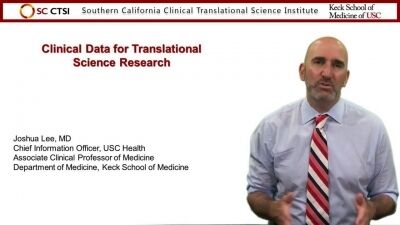Computer databases and information systems have transformed virtually all aspects of health care and clinical research in the U.S. and internationally, impact that will only continue to grow in significance and breadth. Understanding these resources -- what they are, how they are structured, and how to use them -- is critical for clinical/translational researchers who wish to unlock their full potential for study.
In Part 1 of the videos accompanying the short course session, "Clinical Data for Translational Science Research," the lecturer introduces several of the most important health databases, including electronic health/medical records produced by hospitals and academic health care systems, health care payor billing and administrative systems, tumor and other registries, among others. The lecturer discusses issues involved in accessing, analyzing and aggregating information from these databases for research, and discusses the various ethical concerns and regulations surrounding their use, such as de-identification of data and patient confidentiality.
In Part 2 of the video, "Bioinformatics and High-Density Data," the lecturer discusses applications of bioinformatics and research involving extremely large quantities of "high-density" data, to address problems in biology, particularly molecular biology. The lecturer describes the rise of bioinformatics, with DNA sequencing in the 1960s, and its sharp growth during recent decades into a multidisciplinary field comprising numerous computational methods and tools that apply computer and information technologies to store and use data.


